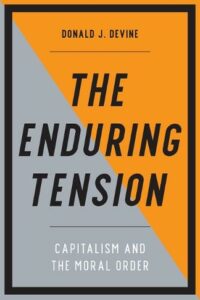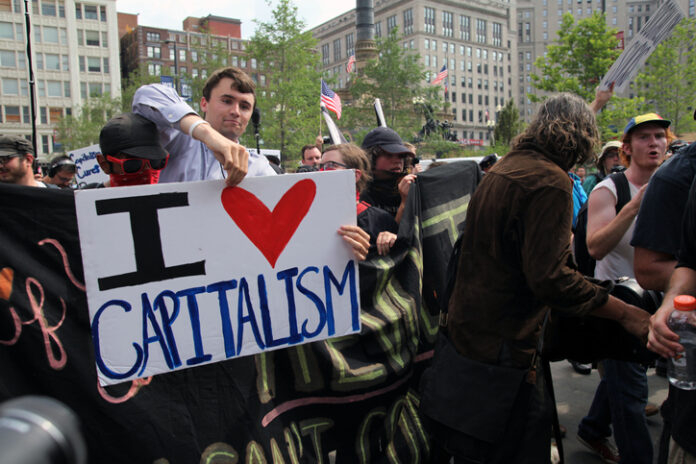Review of The Enduring Tension: Capitalism and the Moral Order, by Donald J. Devine, New York: Encounter Books, 2021
Some of us know Donald J. Devine as the very effective head of the Office of Personnel Management during Ronald Reagan’s administration, where he oversaw not only hiring but a reduction in staff of about 600,000 people. But in addition, Devine is a political scientist who taught for more than two decades at the University of Maryland and Bellevue University.
 His areas of expertise—political science, philosophy of science, and public administration—weigh heavily in his latest book, The Enduring Tension: Capitalism and the Moral Order. His book is concerned with the forces that threaten to destroy capitalism and, with it, the accomplishments of Western civilization. The stakes are high. Says Devine:
His areas of expertise—political science, philosophy of science, and public administration—weigh heavily in his latest book, The Enduring Tension: Capitalism and the Moral Order. His book is concerned with the forces that threaten to destroy capitalism and, with it, the accomplishments of Western civilization. The stakes are high. Says Devine:
“Western civilization under its capitalist economic order has produced a worldwide cornucopia of consumer goods and a remarkable improvement in human health. But few among the beneficiaries are grateful. Many in the West are instead reconsidering socialism as an alternative economic order and way of life. “
So this is a big book, dealing with a big problem: the potential loss of Western civilization via the destruction of capitalism. It’s important to understand that for Devine, capitalism is more than the freedom to buy and sell in the marketplace. He sees such freedom as essential, but it is part and parcel of a social system that is intertwined with and supported by tradition, religion, and morality; i.e., Western civilization.
Devine observes that “even a libertarian icon like F.A. Hayek argued that a functioning market cannot be purely laissez faire, but necessarily rests on moral custom and law.” Thus, it must have “rules forbidding theft and fraud, government administration of justice, and protection of property.”
Those rules made commercial trade and innovation possible on a large scale. They have a long history; key milestones include “the biblical moral code, property rights from Roman law, a Christian-inspired individualism, the monastic valorization of work, and early banking practice.”
As you can tell already, this book ranges widely through time and subject matter. The descriptions, analysis, and anecdotes are somewhat dizzying. On one page you can be reading about the medieval Peace of God movement and on another about the latest embarrassing failures of American bureaucracy, from the War on Poverty to the inability of the FBI to follow clues that could have prevented terrorist massacres.
Devine’s views have been very much affected by the fusionist movement of the 1950s, which favored a capitalism grounded in tradition. William F. Buckley and Frank Meyer brought traditional conservatives and libertarians together, creating a movement that was politically successful and led to Ronald Reagan’s presidential victories in 1980 and 1984.
In Devine’s view, this fusionism combined freedom and tradition somewhat the way Edmund Burke did in the eighteenth century. It was “a pro-freedom, pro-capitalist, pluralist, decentralized conservative fusionism.” Its adherents viewed conservatism as “both tradition and freedom permanently in tension.”
In spite of the movement’s achievements, this approach to conservatism began to fade after Reagan’s presidency—partly, says Devine, because political success began to replace principle. A sign of the decline was the tendency to moderate the idea of capitalism with George H. W. Bush’s “kindler and gentler” policies and his son’s “compassionate conservatism,” both signs that capitalism was losing respect. The rise of “crony capitalism” indicates that in some cases entanglements of self-interest and politics had replaced capitalism itself.
Devine discusses in detail the ideas and policies that have been undermining capitalism. They include constructivism, centralized bureaucracy, and scientific rationalization.
Constructivism is the view that society (and its many parts) can be planned—and that society will turn out as planned. This is the “fatal conceit” identified by F. A. Hayek: the confidence in centralized planning. The fatal conceit pervades efforts to put spontaneous human actions under the control of others. This effort to “rationalize” society leads to governmental “expert” bureaucracies, “pluralistic administrative bureaucracies,” and even scientific rationalization. All these movements narrow the freedom of the average person.
Although this review cannot cover all these threats, let’s look at a surprising one: scientific rationalization. Surely science is not undermining capitalism—or is it? Devine goes to some length to show that although many people believe that science has replaced religion, there is dispute over even the most fundamental scientific questions, such as quantum mechanics vs. general relativity. If such basic principles of physical science are in dispute, how can the social sciences confidently answer fundamental questions of human behavior?
To illustrate, Devine quotes a comment by Alan Greenspan, former Federal Reserve chairman, written in his memoir. Greenspan admits he was totally surprised by the financial crash of 2008.
“It all fell apart,” wrote Greenspan, “in the sense that not a single major forecaster of note or institution caught it. The Federal Reserve has got the most elaborate econometric model, which incorporates all the newfangled models of how the world works—and it missed it completely.“
Yet the Fed is a governmental institution that we are supposed to have faith in for its data and expert analysis, Devine notes.
If you pick up The Enduring Tension, you will soon see that “a society where liberty and order exist in creative tension“ is well worth preserving.
Whether it will be preserved is a question that even so astute an observer as Devine cannot answer.











I very much enjoyed reading this. Sounds like a great book.